Forget for a moment the scales, the spiky fangs and the fiery breath, and contemplate the question at the heart of "House of Dragon": What is a dragon? Series co-creator Ryan Condal wrote the Season 1 finale, "The Black Queen," in a way that answers that question but only in part. The beast represents power, to a point.
The branch of the Targaryen tree mothered by Alicent Hightower (Olivia Cooke), known as the Greens, has claimed the Iron Throne in the name of Aegon Targaryen (Tom Glynn-Carney), Alicent's firstborn with the deceased king Viserys.
They have fewer dragons under their control than Rhaenyra Targaryen (Emma D'Arcy) and her family do. Yet the Blacks, as Rhaenyra's children Lucerys, aka Luke (Elliot Grihault), Jacaerys, or Jace (Harry Collett), and Joffrey are known, have younger, smaller dragons, as does their mother and stepfather Daemon (Matt Smith).
Physical size matters, as the finale's culmination proves, when Luke, astride his young dragon Arrax, is pulled into a mid-air dogfight with his bully of a cousin Aemond (Ewan Mitchell) riding the gargantuan and older Vhagar.
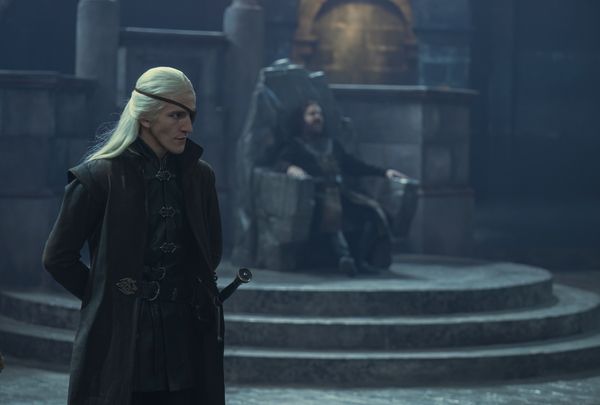 Ewan Mitchell as Aemond Targaryen in "House of the Dragon" (Gary Moyes/HBO)
Ewan Mitchell as Aemond Targaryen in "House of the Dragon" (Gary Moyes/HBO)
Rhaenyra had sent Luke as her emissary to Storm's End, the Baratheon stronghold, to remind Lord Borros Baratheon (Roger Evans) of his father's oath of loyalty to her, believing the trip to be shorter and his mission easier.
But Aemond arrived first on his flying Tyrannosaurus Rex, with a marriage offer for one of Lord Borros' daughters. Aemond tries to draw Luke into a duel in front of Lord Baratheon, but Luke refuses, honoring his pledge to his mother not to fight. But Aemond wanted one, especially with the boy who took his eye. That is, until he didn't. Aemond followed his retreating cousin adragonback into a storm to taunt him, but neither Arrax nor Vhagar got the message that Aemond was only toying with Luke.
It makes a person wonder whether a TV show's loyalty to the book serves the audience as ably as some additional creative departure might have.
The little dragon took a flamethrower to the giant's eye before, in a move reminiscent of Luke's "Star Wars" namesake, maneuvering into a nearby rocky outcrop with passages too small to accommodate Vhagar. Just when it seemed the kid was clear and ready to go home, the elder dragon ended all hope for Queen Rhaenyra and Queen Alicent to solve their problems peacefully.
Up until the moment she receives the news, Rhaenyra handles her ex-best friend's ultimate betrayal as calmly as one can. Considering that the initial blow causes her to go into labor prematurely, giving birth to a stillborn son, she's downright saintly, devoted to maintaining the safety of the realm as the men around her clamor for open war.
But the final frame of the season shows her face after she's gotten the news of what's happened to Luke. Rhaenyra's queenly forbearance has run out. The . . . end?
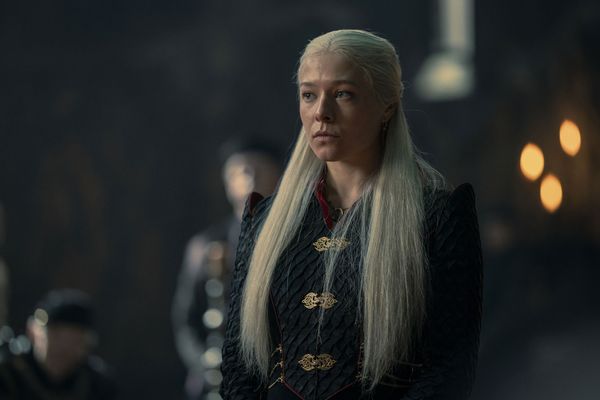 Emma D'Arcy in "House of the Dragon" (Ollie Upton / HBO)
Emma D'Arcy in "House of the Dragon" (Ollie Upton / HBO)
Yes, that is how the first season of "House of the Dragon" snapped shut its jaws. Season 2 has already been picked up, and it's unlikely to have much of a problem bringing the audience back into the den. Viewers are invested in this series, although more than a few of them can't figure out why that is. The finale isn't going to answer that question either.
Instead, it makes a person wonder whether a TV show's loyalty to the book serves the realm – or the audience – as ably as some additional creative departure might have.
HBO's George R.R. Martin universe is a sucker for symmetry: In the same way the first season of "Game of Thrones" began with a dead direwolf leaving behind puppies tied to the Stark children's fates and ended with an abandoned Targaryen hatching three dragons from stone, "House of the Dragon" opened with a terrible birthing scene and ended with one. Each was hideous enough to make people who can give birth question why anyone would want to, but the tight shot of the blood and fetal tissue sliding out of Rhaenyra in the finale was a true horror show.
Director Greg Yaitanes explains in the post-game, behind-the-scenes installment that he wanted to depict the birth as Rhaenyra "being at war with her own body" which is . . . a thought. Is there a clause in all "Game of Thrones"-related titles' contracts that women must suffer onscreen mightily, somehow, in ways designed to make viewers' lady parts spontaneously heal over?
But let's shake that off and return to the doomed duel between Aemond and Luke, and Vhagar and Arrax. This is the inciting incident that kicks off the Dance of the Dragons according to Martin's "Fire & Blood," which means Condal hit the mark as the book prescribed. However, if ending the season on Rhaenyra's rageful visage felt dissatisfying, that could be because we're accustomed to moments like this being penultimate episode plot material.
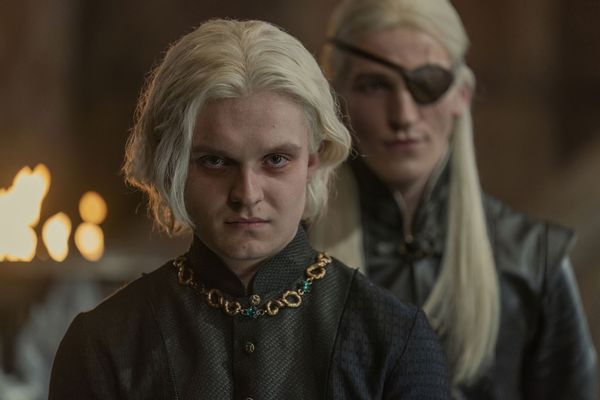 Tom Glynn-Carney as Aegon Targaryen in "House of the Dragon" (Ollie Upton/HBO)
Tom Glynn-Carney as Aegon Targaryen in "House of the Dragon" (Ollie Upton/HBO)
Imagine, for instance, if the first season of "Game of Thrones" seasons ended with Ned Stark's beheading, or the third blinked out for a year after the Red Wedding. We'd be shocked, certainly, but also left adrift. Writers have amply chronicled the many mistakes David Benioff and D.B. Weiss made as showrunners, but structuring seasons to conclude with a sense of mystery and triumph wasn't one of them.
Can we mourn Luke's death without knowing anything about him?
Condal and his co-showrunner Miguel Sapochnik also have a challenge and opportunity their predecessors didn't, in that they began the show with dragons and ended the season by showing what one of them can do . . . sort of. For all the mystery around the "song of ice and fire" hidden in the blade Viserys passed to Rhaenyra, we didn't see much of the latter.
Neither were we given many reasons to emotionally connect to any of these characters aside from Rhaenyra, Alicent and Daemon. Can we mourn Luke's death without knowing anything about him? Yes, he was a small child, but so was that puddle of goo Rhaenyra screeched out of her body earlier in the episode. These feel like abstract tragedies inserted to flip the switch from calm leadership into that "fire and blood" mode we've heard much about.
In case we needed to be reminded that Daemon is The Sexy Worst, his means of persuading Rhaenyra to take a more aggressive war footing amounted to strangling her. And she's the relative the writers spend most of the season persuading us that he truly loved!
Even so, "The Black Queen" has a few triumphs worth noting. The Dragonstone war council's table, lit from below by candles, was a flawless design achievement. Where can we get one?
Want a daily wrap-up of all the news and commentary Salon has to offer? Subscribe to our morning newsletter, Crash Course.
Above that eye-catcher, however, is the performance from Eve Best, a quiet yet forceful presence all season long. But Rhaenys' enigmatic smirk as she watches Rhaenyra handle her first test is a damn thesaurus, articulating much without opening her mouth. Only when she stands up for Rhaenyra with her wavering husband Corlys (Steve Toussaint) is it clear that the faint smile is one of deeply earned respect.
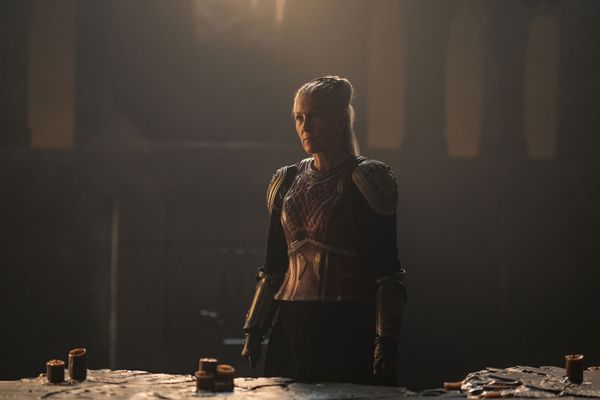 Eve Best in "House of the Dragon" (Ollie Upton / HBO)
Eve Best in "House of the Dragon" (Ollie Upton / HBO)
This finale provides a fine showcase for actors to display their range through silence, as Mitchell does when he realizes what Vhagar's fateful chomp means for the realm's future, allowing the prideful, sneering Aemond to show some humanity for once.
Inadequately addressed, however, is the larger question of what makes some Targaryens more special than others. Daenerys Targaryen, aka The Unburnt, understood that dragons aren't simply magical creatures the Targaryens ride but a mystical designation that made a few among them extraordinary and, to be specific, fireproof.
Rhaenyra tells her children that it has been said about Targaryens, "We are closer to gods than to men." Very little within this first season of table-setting hints at why that is, trusting the audience to understand what she's talking about due to the web of lore "Game of Thrones" spun over its eight seasons. We do, but that isn't enough of a reason to spend 10 episodes engaging in the narrative equivalent of slowly, deeply inhaling only to have the show hold its breath.
"When dragons flew to war, everything burned," Rhaenyra reminds her allies. It's a terrible possibility, but preferable to leaving us cold and waiting for an undetermined amount of time to see whether this story will ever light up.
Read more
about "House of the Dragon"


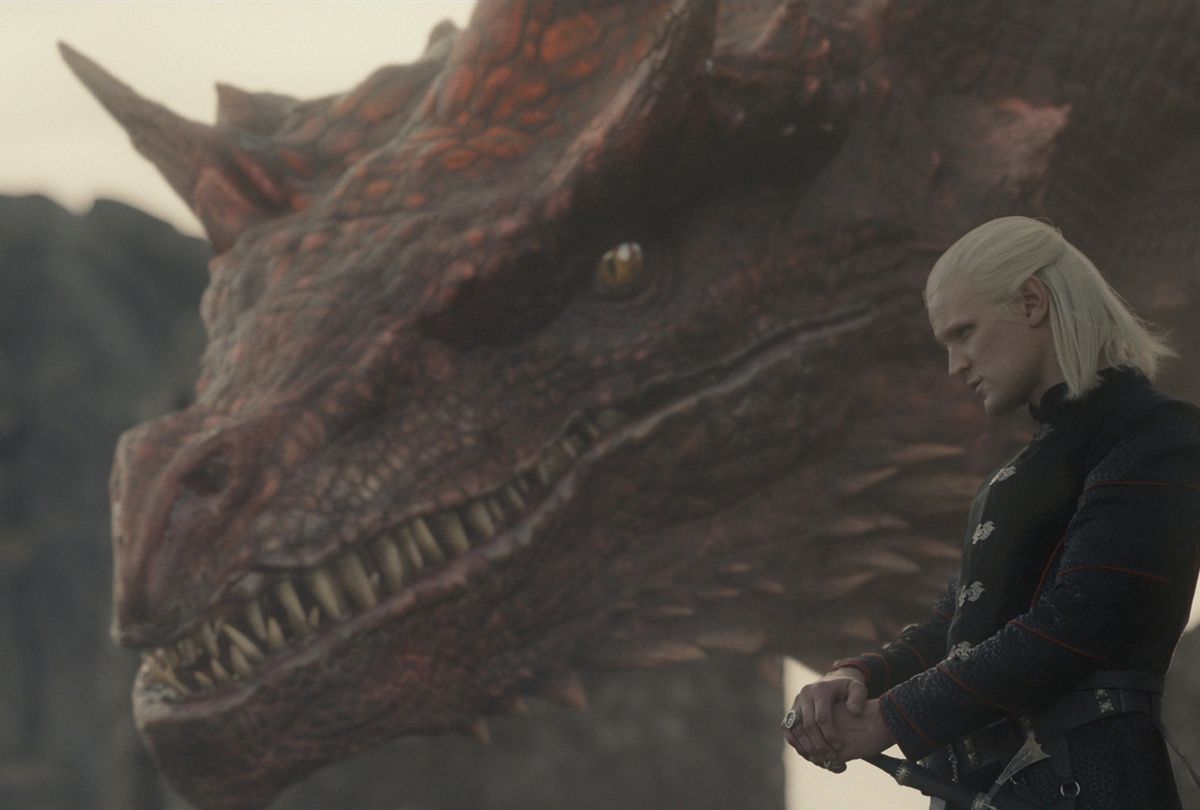
Shares